Books
The Marriage Game (2014)
THE MARRIAGE GAME
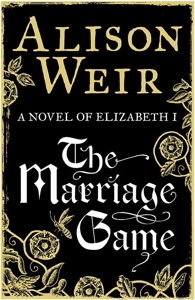
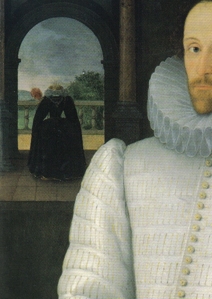
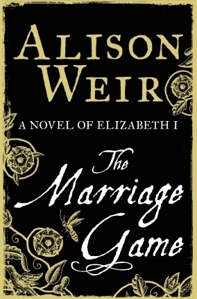
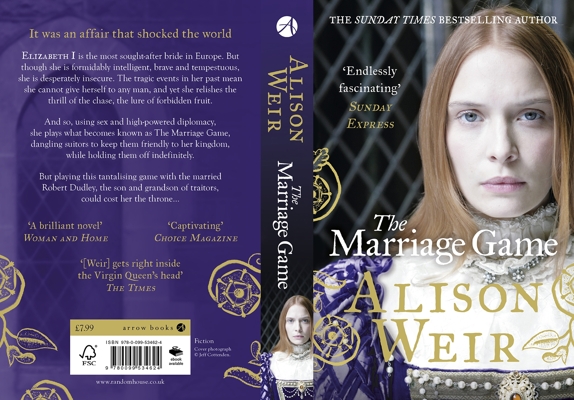
The sequel to The Lady Elizabeth
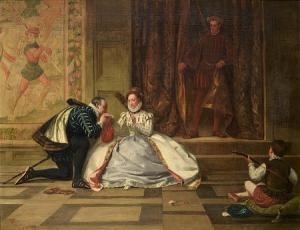
It is one of England’s most scandalous royal love affairs: the romance between the young “Virgin Queen”, Elizabeth I, and her handsome courtier, Lord Robert Dudley. With intricate period detail and captivating prose, New York Times bestselling historian Alison Weir’s The Marriage Game manoeuvres through the alliances, duplicities, intrigue and emotions of a woman intent on sovereignty—over her country and herself.
Did they or didn’t they? It’s the provocative question at the heart of the novel. When the young Queen Elizabeth begins a flagrant flirtation with the handsome but married Lord Robert, taking long unchaperoned horseback rides with him, many believe them to be lovers. Over time, rumours spread that she is no longer a virgin, and that she has secretly given birth to Lord Robert's child. When Robert's wife is found dead, lying at the bottom of a staircase with her neck broken, there is universal shock followed by accusations of murder.
"THE MARRIAGE GAME is a magnificent novel full of the secrets and scandalous affairs of the Tudors."
"I have failed at doing all the work I'm supposed to do this weekend - I'm completely gripped by your book! You bring Elizabeth to brilliant, incredible life - I'm loving every minute. It's fabulous stuff - can't put it down. The Marriage Game is brilliant and breathtaking. Elizabeth explodes from the page, a full blooded woman, all desire, passion and touching vulnerability. She wins our hearts - we feel for her torments over her marriage, her need to love - as she is torn between her role as Queen and her feelings. Against an incredible panorama of a golden age in British history, Elizabeth loves, throws tempests and doubts. Alison Weir gets right into the Queen's heart and shows us her emotional turmoil over the handsome, loyal Robert Dudley. As the tension in the kingdom mounts, and Mary Queen of Scots plots further to seize the throne, the Queen is forced to fight for her life - and her heart. After Weir's superb The Lady Elizabeth, The Marriage Game continues the story. Astonishing and unforgettable in its intimacy, it is a wonderful story of secrets and lies - and a heart-stunning portrayal of the Queen that you'll never forget." (Kate Williams, historian, novelist and author of the forthcoming trilogy, The Storms of War)
"Alison Weir turns the spotlight on a murkier-than-usual piece of Tudor history and she gets right inside the head of the Virgin Queen. The reader has a blissful sense of seeing history as it happens." (Kate Saunders, The Times)
"With the vogue for Tudor history at its height, this is a brilliant novel that focuses on the volatile relationship between Elizabeth I and the charismatic Lord Robert Dudley." (Woman and Home)
"The story of the Virgin Queen remains fascinating. Fans of Tudor fiction are in the safe hands of historian Alison Weir." (Woman)
"Her latest Tudor triumph." (The Daily Express Online)
"Alison Weir brings Elizabeth to life." (Hunts Post)
"This breathtaking novel tells the tale of Elizabeth I and her affair with Lord Robert Dudley. With secrets, mystery and tragedy swirling around their romance, Elizabeth's naked lust almost costs her the crown." (InsideSoap)
"A must-read for all Tudor fanatics… It seems our fascination with the most successful of the Tudor monarchs will never abate. The Marriage Game takes us from Elizabeth's accession to her death and it really is a fascinating and thought-provoking read, not least because it backs up every assertion with real evidence from the period. Alison Weir is one of our favourite accessible historians." (The Book Bag)
"What Alison Weir has done in The Marriage Game is open a window into Elizabeth's complex and confounding soul... ‘Politics, historical detail and unfulfilled love in Weir's endlessly fascinating account of Elizabeth I's attempt reconcile her personal passions with public life . . . The sheer weight of Weir’s scholarship underpins the narrative, making it endlessly fascinating." (The Sunday Express)
"Based on in-depth knowledge of Elizabeth’s court, and the intrigues that swirled around it, the novel has the benefit of both verisimilitude and captivating story-telling." (Choice magazine)
‘The captivating, tempestuous, often hilarious and ultimately poignant story of the extraordinary love affair between Elizabeth I and Robert Dudley.’ (Historical Novels Review)
"Alison Weir brings all her knowledge of Elizabeth I to vivid life . . . The Marriage Game is a dramatic, complex and deeply poignant tale of intrigue, love and loss. Fantastic." (Books Monthly)
"Weir deftly follows The Lady Elizabeth, her 2008 novel about the young Elizabeth I of England [and] trains her spotlight on Elizabeth’s equivocations over marriage. Lively bedroom scenes and discordant council meetings reveal Elizabeth’s complexities, depicting her as a wily coquette determined to rule England alone. A nuanced portrait of [Robert] Dudley, whose love for Elizabeth remained steadfast despite her vacillation and his other marriages, balances Weir’s sympathy for her subject. Weir’s credible characters and blend of the personal and political will sweep up readers of this engrossing behind-the-scenes psychological portrait of Elizabeth." (Publishers Weekly)
"Weir’s impeccable reputation as both a historian and a master storyteller guarantees a huge audience for another intriguing Tudor-themed tale." (Booklist)
"Weir paints a fascinating picture of Elizabeth's years as queen. There is enough drama here for a PBS series." (Romantic Times)
"A 500-year-old royal scandal rears its head. In her latest novel, Weir looks at 'The Virgin Queen' Elizabeth I’s life with Lord Robert Dudley, her charming — and very married — Master of the Horse. When Dudley’s wife is found dead, tongues wag around the world that Robert has murdered his wife in order to marry the queen. He never does. Weir uses fiction to look at the question of what really happened in this love triangle. Alas, sometimes 500-year-old mysteries raise more questions than answers.' (New York Post; chosen as one of This Week's Must-Read Books)
"An entrancing novel... If you're fascinated by [this] period of English history, you'll find The Marriage Game a delight. Weir manages to weave actual history and the imagined kind together seamlessly." (Huntington News)
I could not put this book down, yet didn't want to rush through it either. I found myself dragging out the reading process, limiting myself to a specific amount of pages on my journey to and from work, and a few slithers of pages in the evenings at home. The temptation to dive back into it during my lunch break was immense, and on some days the lure of temptation was simply too much!
'The Marriage Game' is extremely well written, and provides are very believable argument for why Elizabeth didn't marry... I really enjoyed 'The Marriage Game', and I highly recommend it. It is informative without being too heavy, with just the right amount of poetic licence on Weir's part to really bring this story to life. Filled with suspense, intrigue, wit and heartbreaking decisions this is one book I will be revisiting again, and again. It is exactly the type of historical fiction that appeals to me." (Poppy Coburn)
"Marvellous fiction from Alison Weir... Through Weir’s intimate prose we see that the marriage game was no game at all but a battle." (The Gilmore Guide to Books)
Book of the Week in The Lady.
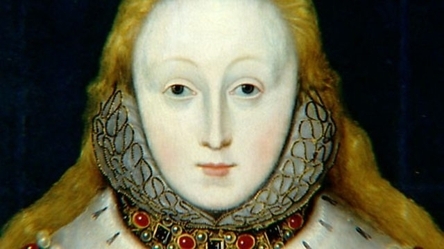
Their affair is the scandal of Europe. From the time of her accession in 1558, the young Elizabeth I – already reinventing herself as the Virgin Queen – and her dashing but married Master of Horse, Lord Robert Dudley, cast caution to the winds in pursuing their passion for each other. Many believe them to be lovers in the fullest sense, and Elizabeth soon becomes aware of rumours that she is no virgin at all, and that she has secretly borne Lord Robert children.
The young Queen is regarded by most of Christendom as a bastard, a heretic and a usurper, yet many princes seek her hand in marriage. Knowing her hold on her throne to be desperately insecure, Elizabeth encourages them in order to keep them friendly towards England. And thus she plays what becomes known as ‘the marriage game’, appearing seriously to entertain these suitors while holding them off indefinitely. The truth is that she has no inclination to marry, bear children or render herself subservient to any man. The prospect of marriage is anathema to her, and she has deep and compelling psychological reasons for wishing to avoid it. It is the game of love that is the breath of life to her - the thrill of the chase, the lure of forbidden fruit. She plays this dangerous, tantalising game with Lord Robert Dudley – but it is a game, she realises - almost too late, that could ultimately cost her the throne.
For Robert is the son and grandson of traitors, and his growing intimacy with Elizabeth makes him deeply unpopular: he is distrusted by her more sober ministers – notably William Cecil - and resented by her courtiers, who think him inordinately ambitious, unscrupulous – and worse.
The notorious affair between Dudley and the Queen quickly gives rise to rampant speculation throughout Christendom that she is determined to marry him, and even that they are plotting the murder of Robert's sick wife, Amy. There is universal shock when Amy is found dead, lying at the foot of a staircase with her neck broken.
In telling the captivating, tempestuous, often hilarious and ultimately poignant story of this most extraordinary love affair, and the political intrigues and marriage negotiations that surrounded it, I have delved into the various mysteries that encompass Elizabeth’s relationship with Dudley.
Did they or didn`t they? Rivers of ink have been spilt in determining the answer to this question, and as a historian I have my own strong views about it – not necessarily those that prevail in The Lady Elizabeth! In The Marriage Game, Elizabeth has reinvented herself as the Virgin Queen, but Robert Dudley is determined to overcome her fears of intimacy and become her lover, if not her husband. The other crucial issue is, of course, the fate of Amy Robsart, and this novel offers a dramatised version of my own theory.
It is a book packed with all the colour and splendour of the Tudor court – and a story played out amidst the most famous events of the Elizabethan age, culminating with the execution of Mary, Queen of Scots and the defeat of the Spanish Armada. It is a poignant tale of love and loss, focusing on the highs and lows of Elizabeth`s long affair with Dudley and the dynamics that enabled it to last for so long. A wealth of source material has enabled me to bring Elizabeth, that feisty, formidable, witty and mercurial woman, to life – and to get inside her head and relive this most extraordinary and controversial of royal love affairs.
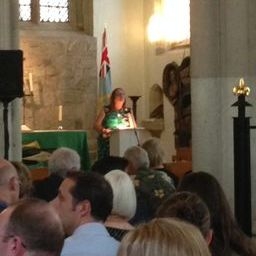
Speaking on The Marriage Game in the Chapel Royal of St Peter ad Vincula in the Tower of London on 25th July 2014.
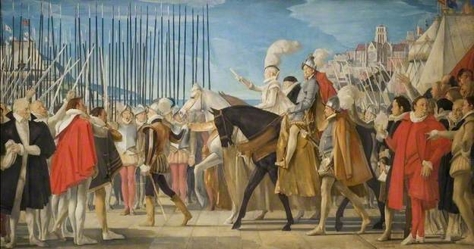
Read about The Marriage Game here:
http://gb.pinterest.com/alisonweir2012/the-marriage-game/
To read 'All the Queen's Men', an article in the Daily Express by Jane Warren, based on an interview with me, please visit http://www.express.co.uk/news/royal/486639/All-the-Queen-s-men-Was-Elizabeth-I-really-the-virgin-Queen
Interview for Style and Fashion magazine, Canada, 2015
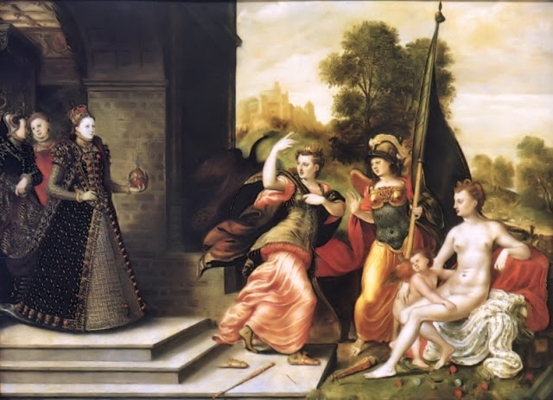
Tell me about yourself. How did you start working as a historian?
When I was fourteen and had abandoned books in favour of pop magazines, my mother marched me into a library and said, ‘Get a book!’ The one I chose – my first adult novel – was about Henry VIII’s first wife, Katherine of Aragon; I devoured it in two days and fell in love overnight with the Tudor period. Immediately I scoured my school library to find out the facts, and began collating information and writing my first book, a biography of Anne Boleyn, which I completed when I was fifteen. I’ve been researching and writing ever since, professionally since 1988.
You’ve spent so many years researching the Tudor era – do you ever start to feel like you’re living there with them yourself?
I do when I’m writing. It’s an intense experience and you need to immerse yourself in the period in order to understand it. I do a lot of background research, most of which I don’t even use, but it helps to inform the book.
How do you maintain the balance between history and fiction?
Writing history is a discipline; you are bound by the constraints of the source material and legitimate inference and speculation. You have more scope with historical fiction, yet you still need to do the research, and what you invent has to be credible within the context of what is known about the subject. I keep the two genres very separate in my mind. Maybe having written a lot of history before I attempted fiction helps. It was harder to take of my historian’s hat and become a novelist – a huge learning curve.
What is your process when it comes to writing these books?
With history, I no longer compile files full of research notes in chronological order then write them up. I now begin with the outline of the book – usually the proposal sent to my publishers – and research into it, dividing the text into chapters where appropriate. It’s a much more efficient way of writing a book. With fiction, I just start at the beginning and go on a roll!
It’s interesting - and almost ironic - that years later, historians and authors are still trying to paint a picture of a woman who famously declared she had “no desire to make windows into men’s souls.” Why do you think Elizabeth I remains such a fascinating figure to us so many years later?
That quote actually relates to the Queen’s desire not to probe the private religious beliefs of individuals. Elizabeth fascinates for many reasons. She was a woman in a male-dominated age, a great survivor whose youth was overshadowed by tragedy and danger. A bastard, heretic and usurper in the eyes of Catholic Europe, she inherited a bankrupt kingdom and died a legend 45 years later. No queen ever played such a prolonged game of courtship with so many suitors. And the many enigmas surrounding Elizabeth fuel endless debate.
What is a lesson that women today can learn from Elizabeth?
That a woman who succeeds in a career may have to make sacrifices in other areas of her life, but that she can enjoy all the advantages of male attention without subsuming herself in a relationship.
How do you think the course of history would have changed if Elizabeth had married Dudley?
I think she would have risked her throne; it may have toppled her, because Dudley was unpopular and – crucially - people would have deemed her guilty of conspiring in his wife’s death. Civil war may have followed, because there was no clear heir to the throne, and the rival claimants were of different religions. Spain or France may have exploited the situation to set up Mary, Queen of Scots on the English throne. Elizabeth may not have survived. But if she had succeeded in riding out the storm (which she was capable of doing) she may have had children - and we might well have the Tudor dynasty ruling over us today.
What can we expect next from you?
I have just finished The Lost Tudor Princess, a biography of Margaret Douglas, Countess of Lennox, which is due to be published in the UK this autumn; and I have been commissioned to write six novels on the wives of Henry VIII, which will be published yearly from 2016.
Interview for FEMALE FIRST, 2014
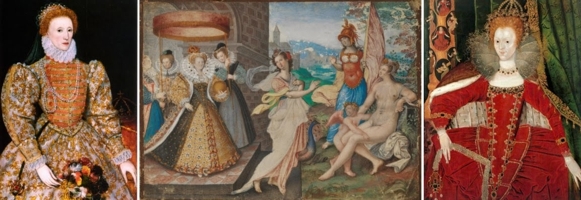
What can you tell us about your new book The Marriage Game?
It tells the astonishing story of the celebrated courtships of Elizabeth I, the Virgin Queen, and I have made creative use of historical sources to tell this tale in as authentic a manner as possible, bringing the formidable, complex character of Elizabeth to life for readers who like to learn about history through fiction.
I wanted to show how Elizabeth managed masterfully to play what is often called ‘the marriage game’ for a quarter of a century without committing herself to any man. In it I have explored how the beheading of her mother, Anne Boleyn, and others close to the young Elizabeth, impacted on the Queen’s emotional and sexual life.
The book is chiefly the story of the tempestuous and ultimately poignant relationship between Elizabeth and Robert Dudley, Earl of Leicester, the man whom she loved more than any other, and it addresses the question that everyone asks: did they or didn’t they? It also explores the mystery surrounding the murder of Robert’s wife, Amy Robsart. Above all, it shows how Elizabeth – regarded by much of Europe as a bastard, a heretic and a usurper – managed to survive as a female ruler in a male-dominated world and emerge triumphant over her enemies.
When did your passion for history begin?
When I was fourteen my mother enrolled me for the first time in an adult library and said, ‘Get a book!’ Wandering around idly, I found one that looked intriguing. It was a novel about Katherine of Aragon, the first wife of Henry VIII, and entitled Henry’s Golden Queen the author was the prolific and exotically-named Lozania Prole. I devoured it in two days; I could not put it down. A whole new wonderful world was opening before me. I had to find out more. Overnight I was hooked!
Please tell us about your research process into the book.
I begin with a Word document, which is always the proposal that was sent to my publishers before the book was commissioned. It’s a brief overview of the story/facts and my approach to it. I start with primary sources, adding into the narrative all the time, before going on to the secondary sources. The book is constantly evolving, and there comes a time when I have to divide it into chapters. I have found this the most efficient way of crafting a book.
Why is Elizabeth’s story so fascinating for you?
What I find so outstanding about Elizabeth is not only her intelligence and forceful personality, but her being a great and successful ruler in an age of outstanding achievements: the era of the Armada, Drake and Raleigh, Shakespeare, Spenser and Marlowe, and of some of the most able politicians ever to serve an English monarch.
Elizabeth presided over this age and was its inspiration, even if she did not actively influence all its successes. She was also the chief promoter of the English Protestant settlement and a great champion of burgeoning nationalist sentiment. Throughout her reign, she worked hard to earn and retain the love of her people. 'Be ye well assured I will stand your good Queen,' she told her subjects as she rode to her coronation.
Yet what most fascinates me is Elizabeth's role as a woman. Feminists, and indeed many women, see her as an icon because she triumphed as a female ruler, exercising sovereign power brilliantly and effectively in a male-dominated world. She proved she could rule independently without the help of a man and successfully asserted her autonomy by cleverly fielding all the proposals of marriage made to her. Although the appalling circumstances of her childhood and youth could have made her a victim, she rose above them and made an outstanding success of her life. She was a great survivor: she inherited a bankrupt kingdom, yet against all the odds she died a legend 45 years later.
You write fiction and non-fiction books so do you have a preference between the two?
That’s a hard question to answer! I enjoy both immensely: it’s a joy to be able to interpret history in different ways.
How difficult is it to write historical fiction without overloading the reader with time bound details?
It was very hard at first to come down off the fence and stop being a historian, but I have benefitted from the advice of outstanding editors, from whom I have learned so much about the writing of historical fiction. One of the first rules is that the facts have to be seamlessly incorporated into the narrative, through speech, or showing rather than telling, so that the reader isn’t daunted by an overload of history.
What is next for you?
I am working on The Princess of Scotland, a biography of Margaret Douglas, Countess of Lennox, and revising an earlier book, The Six Wives of Henry VIII.
(http://www.femalefirst.co.uk/books/alison-weir-the-marriage-game-490715.html)
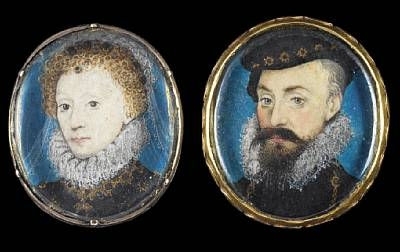
INTERVIEW FOR QUEENANNEBOLEYN.COM, 2014
Alison, your novel the marriage game focuses concerted attention upon the plethora of marriage proposals and resulting negotiations matching the Queen of England with an assortment of highly placed European royalty and nobility. Just how big an influence did these proposals and resulting negotiations have upon Elizabethan politics and foreign policy?
I think they had a profound influence, because ultimately they kept foreign princes (who might have been hostile to England) friendly in anticipation of an alliance. They were also a highly useful political bargaining counter.
Do you believe Elizabeth's relationship with Robert Dudley in any way compromised foreign marriage negotiations?
Yes, undoubtedly. On several occasions foreign ambassadors and suitors came to believe that the Queen really did mean to marry Dudley, and that continuing negotiations would prove fruitless. Some were put off by scandalous gossip, or by Elizabeth flaunting her favour to Dudley. But in such cases she often had her own agenda, using the relationship to scupper unwelcome proposals.
Most people think of Robert Dudley as Elizabeth's lover and favorite. Also forefront in their minds is the controversy surrounding the death of his first wife. In truth, he was also exceptionally accomplished. Just how supportive was Robert Dudley towards Elizabeth in her queenship? Was his relationship with Elizabeth more a help or a hindrance?
In the earlier years of her reign Dudley was more of a hindrance, being unpopular with, and distrusted by, Elizabeth's councillors and courtiers; they saw him as an unwelcome distraction from any marriage negotiations, and a man unsuited to be king, whose reputation might even topple Elizabeth from her throne if she wed him. But as the years went by, and the pressure on Elizabeth to marry grew ever greater, and Dudley forged better relations with her ministers, they came round to the view that marrying him would be better than not marrying at all. At that juncture the relationship was seen as almost beneficial.
Just because Elizabeth never married does not mean that she would not have liked to. What are your thoughts, Alison? Do you think Elizabeth wanted to remain single through her lifetime as is the common belief?
I think that she decided at a young age that she did not want to marry and never varied from that view. Psychological and political considerations always overruled any inclinations towards marriage that she fleetingly cherished. When it was too late to marry, I think she had some regrets, but that they too were fleeting.
Elizabeth was eventually excommunicated from the Roman Catholic Church. How did this impact her ability to reign with tolerance towards her Roman Catholic subjects? How also did this impact her marriage possibilities with foreign royalty and nobility?
It had a devastating impact, because her personal inclination towards tolerance had to be sacrificed for the sake of her own security and that of the realm. All Catholics were now potential enemies of the state, and it was essential to crush any resistance or subversion on their part. Even so, the Papal Bull did not deter Catholic princes from seeking Elizabeth's hand in marriage - witness the long courtship of the French Duke of Anjou. And after the Armada, even the Pope himself found words of praise for the Queen.
Besides Robert Dudley, was there any other man Elizabeth truly loved?
I think that she may have had an adolescent infatuation for Thomas Seymour, and that she enjoyed flirting with, and the admiration of, courtiers like Christopher Hatton, Thomas Heneage and Walter Raleigh, but I think that Dudley was the great love of her life. After his death in 1588, his stepson Essex could not entirely replace him in her affections: she was much older now, and may have seen in Essex the son she had never had, as well as the flattering courtier, but that relationship was far more complex than the one she had had with Dudley, and seems to have been more about control on either side - and, of course, it ended in disaster with his execution.
I love all the politicians, courtiers and clergy around the Tudor monarchs, so do tell me who do you think was the Tudor Era's most effective all around servant to a Tudor monarch -- Thomas Wolsey, Thomas Cromwell, Edward Seymour, Thomas Cranmer, William Cecil, Francis Walsingham or someone else? Please explain why.
That is an impossible question! I would say that Cromwell and Cecil equally helped to build the political and religious establishment that we have in Britain today, but you might also say that Cranmer was instrumental in laying the foundations of the Church of England, and that Walsingham's spy system saved Elizabethan England from disaster.
Do you believe either or both of the children of Mary Boleyn were fathered by King Henry VIII?
There is convincing evidence that the elder, Katherine Carey, was fathered by the King, and good evidence to show that the younger, Henry Carey, was not. That evidence is discussed in depth in my biography of Mary Boleyn.
Three of the members of QAB all independently asked me to inquire the same question from you. Given this coincidence, I am guessing many browsers would love to know also. Who is your favorite Tudor-era historical figure to write about in either fiction or non-fiction? Why?
Another difficult question! I cannot choose between Elizabeth I, Henry VIII or Anne Boleyn. All are strong, charismatic, well-documented figures who endlessly fascinate and intrigue me.
Well Alison, this is Queenanneboleyn.com, so of course I must ask an Anne Boleyn related question. Beyond a physical resemblance, do you believe that Anne Boleyn had any real influence upon her daughter Elizabeth? If so, can you explain what that influence was?
I don't think that she can have had many opportunities to influence her daughter while she was alive. Elizabeth was brought up in a separate household from the age of three months and Anne was only an occasional visitor. But there can be little doubt that Elizabeth came to admire her mother, whose initial pendant she can be seen wearing in the dynastic portrait of Henry VIII and his family at Hampton Court, and she may well have been influenced by what she learned of her mother's commitment to the cause of reform.
Alison, tell us about the next Alison Weir Tour you are planning. I hear it has something to do with England's great queens.
It's an 11-night tour embracing many wonderful historic sites and places to stay, and it is themed on the story of England's queens from the Norman Conquest of 1066 to the present day. I will lead the tour alongside historians Sarah Gristwood and Nicola Tallis, and we have booked no fewer than ten guest historians as speakers. The tour will run in June 2014, and places are sold out.
Are there any new projects you would like to tell members and browsers about?
I am at present working on a biography, The Princess of Scotland, about Margaret Douglas, Countess of Lennox, and - when I get time - rewriting my earlier book, The Six Wives of Henry VIII. As to future projects, I'm not allowed to say yet!
(www.queenanneboleyn.com)
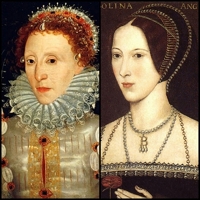
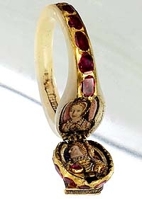
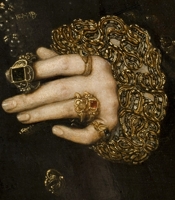
Please visit Biographile for 'Stories Never to Be Forgotten', my article on writing historical fiction. http://www.biographile.com/stories-never-to-be-forgotten-alison-weir-on-historical-fiction/39448/?ref=twt_corp_bio_soc&hootPostID=09959ec5b48f6b801ca0008d51e20f8d
INTERVIEW WITH DISCOVER BRITAIN, 2014
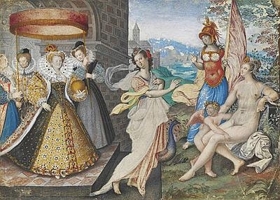
Did you have a particular working method for this book – how did you conduct your research?
I had all the research to hand, having done reams of it for six non-fiction books on (or touching on) Elizabeth I, over many years, so I knew exactly where I was going with it.
Do the former stately homes, castles and palaces of your Tudor characters inspire your writing – and do you spend much time visiting those places? Have you any favourite UK heritage sites?
They do inspire me, immensely, and I feel that it it important to visit them for the purposes of research, because there is nothing like being on the spot to learn about the ambience, atmosphere (particularly important for historical fiction), details and geography. You may also pick up a fund of local knowledge. I visit these sites for pleasure too, and professionally, for book events, and on the themed historical tours that I lead. I have many times had the privilege of visiting, staying at, and/or dining in many historic houses, palaces and castles. Hever Castle has to be my all-time favourite, but there are many close seconds!
Do you feel Elizabeth I had a far more difficult time, being female, than any male monarch past or present?
She had the disadvantage of being seen as hampered with all the perceived weaknessess and imperfections of her sex, and one of the reasons why she did not marry was because she feared the birth of a son who might be used to displace her; but she used her femininity to advantage, and stressed the qualities in herself that were seen as masculine, and therefore admired. Otherwise she faced the same issues as a male monarch would have faced, and coped with them well in her own inimitable way. She also had a talent for choosing brilliant, dedicated and loyal advisers. So I wouldn't say that she had a far more difficult time, as queen, because of her sex. I think she rather revelled in that aspect!
Which character in all your novels has been the most fun to write, and why?
Elizabeth, without a doubt! What a character she was! And there is broad scope for humour, fascinating speculation, and psychological insights into a complex character who was honed in a dangerous and insecure world. The best thing is that there is a wealth of contemporary evidence, including Elizabeth's own writings and speeches, on which to base the characterisation.
What advice would you offer to any budding authors hoping to write historical fiction?
I have learned so much from the brilliant editors with whom I have been lucky to work, but the advice that has stayed with me as a constant is 'show rather than tell', and weave the history seamlessly into the narrative and the dialogue, so that the reader doesn't feel that they are in a lesson. Avoid anachronisms! Above all, enjoy your writing.
(http://www.discoverbritainmag.com/britain/q_a_with_best_selling_historian_alison_weir_whose_latest_novel_the_marriage_
game_hit_bookshops_this_summer_1_3728639)
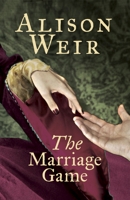
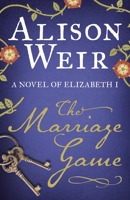

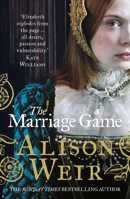
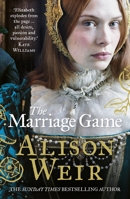
Above: Preliminary jacket designs.
INTERVIEW FOR LISA'S READS BLOG, 2014
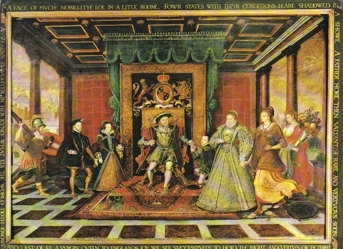
What do you find easier to write; fiction or non-fiction?
Fiction is easier because you don't have to annotate or reference everything, yet it too has its challenges. When writing historical fiction you certainly have more scope for creativity, but you have also to ensure that you maintain credibility. And there can be so many different approaches, so you need to choose the right one.
Are you a planner or a pantser?
I had to look up 'pantser' – had never heard the term! I know where I'm going from the outset, as I've usually done decades of research on my fiction subjects. It doesn't take long before I'm on a roll!
Why do you think the fascination with the Tudors endures generation after generation?
It's such a colourful period and hugely dramatic - you just couldn't make it up. The six wives of Henry VIII, for example! This period is dynamic and exciting, but more significantly for a historian, there are plenty of facts available. The Tudors lived when the private lives of monarchs were becoming public knowledge, and with both the growth of diplomacy and literacy came a wealth of vivid records, not just written but also visual: for example Holbein's paintings. For almost the first time, we can visualise these characters we have heard so much about. The abundance of documentation is a historian's dream.
Who are your favourite historical characters?
Elizabeth I, Eleanor of Aquitaine, Katherine of Aragon (after whom I named my daughter) and Elizabeth of York. There is so much to admire in all of them.
What are you working on now/next?
I am working on The Princess of Scotland, a biography of Margaret Douglas, Countess of Lennox, and revising an earlier book, The Six Wives of Henry VIII.
What are your favourite books/authors and why?
Anya Seton, Norah Lofts and Hilda Lewis were all great writers of historical novels who inspired me to write. I still have novels I wrote as a teenager after reading their wonderful books, and they are still my favourite historical novelists. No one writing in that genre today can beat them.
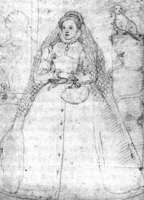
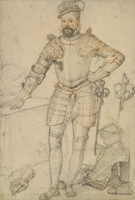
This novel is based closely on the historical record, although I have taken a few liberties. Conversations that took place over two or three meetings have in places been shown as taking place in one meeting. Minor facts have been tweaked. Quotes have sometimes been taken out of context, or put into the mouths of others. Even so, they are accurate in spirit.
The use of language in a historical novel is always a challenge. Here I have made extensive use of the recorded sayings and exchanges of Elizabeth I and the people surrounding her, although I have modernised their words slightly in places, so that they remain in accessible and in keeping with the narrative.
I have also made creative use of many of the legends associated with Elizabeth’s reign: Drake playing bowls before the Armada, Raleigh spreading his cloak before Elizabeth, and Lord Hunsdon drawing his dagger on Dr Burcot. But Elizabeth really did visit the Tower to ensure that all was in order for Norfolk’s execution in 1572.
I believe that Elizabeth had an aversion to marriage for three reasons. First, having witnessed the breakdowns of several marriages within her own family, she did not see it as a secure state, and feared the controversy it might provoke. Second, as she told Robert Dudley, Earl of Leicester, the man she probably loved more than any other, she had no intention of sharing sovereign power: 'I will have but one mistress here and no master!'
Third, and most importantly, in Tudor times a monarch was regarded as holding supreme dominion over the state, but a husband was regarded as having total dominion over his wife. A queen regnant was still a novelty in England: Elizabeth's sister, Mary I, had made a disastrous and unpopular marriage with Philip of Spain, who, expecting to play the traditional authoritarian husband, had chafed against his wife's attempts to assert her regal authority. Elizabeth had no intention of embroiling herself in such an impossible relationship.
'I am already married to an husband, and that is the kingdom of England,' she was fond of declaring. She solved the dilemma over her marriage by taking a courageous decision, revolutionary for her time, not to marry or have heirs. Nevertheless, as 'the best match in her parish', she exploited her marriageability, using it as a weapon to the advantage of her realm.
She might not have married, but was she the Virgin Queen she claimed to be? The debate has been raging since the 1560s, and scurrilous rumours were rife throughout her reign, fuelled by Elizabeth's own behaviour, which was often condemned by her more sober subjects as scandalous. She would allow Leicester to enter her bedchamber to hand her her shift while her maids were dressing her. She was espied at her window in a state of undress on at least one occasion, and in old age, she had a French ambassador squirming in embarrassment for two hours during a private audience by wearing a gown that exposed her wrinkled body to the navel.
Yet many ambassadors, at the behest of prospective royal husbands, made enquiries as to whether or not the Queen was virtuous, and in every case they concluded that she was. She herself could not understand why there should be so many racy tales about her, or claims that she had borne bastard children.
'I do not live in a corner,' she told a Spanish envoy. 'A thousand eyes see all I do, and calumny will not fasten on me forever.' A French ambassador who knew her well claimed that the rumours were 'sheer inventions of the malicious to put off those who would have found an alliance with her useful'. Perhaps most tellingly of all, in 1562, when Elizabeth believed she was dying of smallpox and was about to face divine judgment, she spoke of her notorious relationship with Robert Dudley and swore before witnesses that nothing improper had ever passed between them. It is unlikely she would have jeopardised her immortal soul by telling a lie at such a time.
No one knows for certain why Elizabeth was reluctant to marry. There were probably a number of factors. The horror of her mother`s fate, Katherine Howard`s execution and that, seven years later, of Thomas Seymour, the divorces and matrimonial controversies within her own family, the deaths of two stepmothers in childbed, and her sister Mary I`s disastrous union with Philip of Spain all probably contributed. In this novel I have taken a psychological view based on Elizabeth’s own statements on marriage. She is on record as saying that she hated the idea of it for reasons that she would not divulge to her twin soul. And it is true that, at the age of eight, she informed Robert Dudley – as he recalled later – that she would never marry.
As a historian, I believe that Elizabeth I was in all probability the Virgin Queen she claimed to be, but in the prequel to this novel, The Lady Elizabeth, I explored the possibility that Thomas Seymour had actually seduced the adolescent Elizabeth, and that she had miscarried of the child that resulted. The `what if` aspect of history is always fascinating, and there is some contemporary gossip on which to base this theory - had there not been, I would not have developed this storyline. I know that some readers took issue with it, but having written it in the first novel, I feel obliged to remain with it in the second, and so in The Marriage Game, Elizabeth has reinvented herself as the Virgin Queen, and her aversion to marriage stems largely – but not wholly – from the Seymour scandal of her youth.
I think that that scandal contributed crucially to Elizabeth`s resolve never to marry. It is intriguing to find that most of the men with whom she became involved later were dark and dashing, even a little dangerous, like Seymour. But in reality she kept a tight rein on her emotions on hearing of his death, so we have no way of knowing how deeply it actually affected her. I do not believe that she gave herself fully to Robert Dudley; the evidence suggests that their intimate relationship was much as it was portrayed in this novel.
In 1604, after the Queen’s death, Leicester’s son, Robert Dudley, claimed that his parents had actually been married. Douglass Sheffield testified that the wedding had taken place before witnesses in 1573 at Esher, but her statement could not be supported because all the witnesses were dead. This was probably a ploy to secure an inheritance for Robert Dudley, even though Leicester had only ever referred to him as his ‘base son’, and both he and Douglass had married other people after they parted. So it is likely that they were never married at all.
George Wyatt’s memoir of Anne Boleyn was never finished, hence there is no dedication to a patron. There is also no direct evidence that Elizabeth I asked him to write it, yet he implies that important persons encouraged him, and certainly no less a personage that John Whitgift, Archbishop of Canterbury, the close friend of the Queen, was one of them, replacing an earlier anonymous patron who had died. I have speculated that it might have been Lord Hunsdon. Thus it is possible that Wyatt’s sympathetic defence of Anne, written in response to Catholic calumnies, reflects Elizabeth’s own views.
INTERVIEW FOR THE HISTORICAL FICTIONIST, 2014
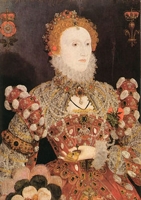
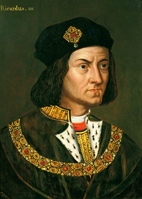
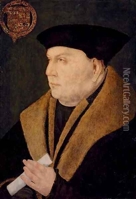
What was the first work of historical fiction you can remember reading?
Henry’s Golden Queen by Lozania Prole. I was fourteen.
Can you recall the moment when you first decided to try writing historical fiction? What inspired you and what was the subject/character?
After reading Anya Seton’s Katherine when I was fifteen I was inspired to write historical fiction. I wrote a novel about Isabella Marshal, the daughter-in-law of King John, and another about Alice Perrers, the mistress of Edward III.
Your latest book is a sequel to The Lady Elizabeth, what made you choose her as a protagonist? And is there ever a moment of hesitation in taking on such a revered monarch?
As a character Elizabeth I is a gift to any novelist, or indeed historian. The great challenge is doing her justice. For that reason I have relied heavily on her own words and those of people who knew her well. I have admired her for so many years, and remain intrigued by her psychology. I hope that my novel credibly addresses some of the crucial issues in her life.
You’ve tended to use famous historical figures as your central protagonists, is this a conscious decision?
Yes, because I enjoy fictionalising history, and writing novels can afford one insights that are not permissible to the historian; but I am currently rewriting an early novel about the generations of families who lived in a fictional English manor house from Norman times to the present day.
Do you think Elizabeth’s character changes from princess to queen, and what helped you to understand this change and bring it to life in your historical fiction?
I could write a book about this! I think that the change was gradual, the result of the shattering events that took place in her childhood and youth. These changes made her wary, cautious and mistrustful. Her inner anxiety manifested itself in panic attacks, psychosomatic illnesses and mood swings, but she was not above putting them on to gain some advantage. Again, I have relied on historical sources to inform my interpretation.
The Tudor Dynasty only lasted 122 years, yet it’s one of the most taught and written about periods of English history, why do you think that is?
The Tudors were dynamic, charismatic characters. The age that bears their name witnessed some of the most dramatic events in our history – a king with six wives, three queens beheaded, royal divorces, a nine-days queen, treasons, plots, religious conflicts, the dissolution of the monasteries, the burning of heretics, the long rule of the Virgin Queen, the beheading of the Queen of Scots, the victory over the Armada, and the flowering of the English Renaissance. You couldn’t make it up! And it’s the first period for which we have detailed sources about the personal lives of monarchs, thanks to the spread of diplomacy, literacy and printing. And it was an age of magnificence, for which there are good surviving visual records: the palaces, the portraits, the jewels. All these things compel fascination.
Elizabeth’s choice - of putting the job before the love life, essentially - seems like a very modern dilemma. Do you see her as an early feminist?
She certainly didn’t see herself as such; she emphasised in herself all the qualities that were admired in men, and referred to herself as a prince. I don’t think that historians should study women’s histories in a feminist context; rather we should evaluate them within the cultural climate in which they lived. Yet I have said myself that Elizabeth’s was a very modern dilemma – but not insofar as that she feared that having a son might cause men to rally around her make heir and displace her.
Your historical fiction has often featured strong women (Elizabeth I, Eleanor of Aquitaine and Lady Jane Grey), what is it about their characters that makes them so interesting to explore in fiction?
I like having the freedom to get inside their heads and explore their motives, reasoning and feelings. I feel that my novels are deeply psychological – that’s how I approach them. And again, these ladies all lived dramatic lives and are the subjects of much speculation.
Are there any other characters in this mould you’d like to write about?
Yes, but just now I can’t tell you who they are! But I have a long waiting list in my head!
Do your historical fiction subject choices normally grow out of your academic research (almost as a by-product of knowing a subject so well and seeing potential areas of interest)?
Yes, they do. I don’t have time – writing history and fiction side by side – to do much research for the fiction. It helps to have studied my subjects for several decades. Sometimes I build a novel on fragments of information - for Katherine Plantagenet in A Dangerous Inheritance there are just four contemporary references – so that gives me a lot of leeway, although I feel strongly that what I invent must be credible within the context of what is known about the subject and their age. Or I can be overwhelmed with source material, as with Elizabeth I, so the way is clearer. I enjoy both these aspects of writing historical fiction. Where the facts are there I use them. Otherwise I use my imagination!
It’s often suggested that academic historians frown on historical fiction as being inaccurate, have you ever found this to be the case?
Yes, and I myself don’t read further in novels when it becomes aware that the research has been only superficial. I think that the academic concern – which I share – is that people come to believe that what they read in historical novels is the truth. I know – because they often tell me so – that my readers care that my novels are accurate and authentic, and I do my best to make them so.
Has the discovery of Richard’s bones changed any of your opinions of the man and the mystery?
Forgive me, but, apart from affording us new understanding of the physical disability that Richard III suffered, and proving that the epithet Crouchback was not just a malicious invention, why should it? It concerns me, as a historian, that the discovery of the bones equates – in the minds of some – with his innocence of, for example, the murder of the Princes in the Tower. It can have no bearing on it. What would be of value would be an analysis of the bones said to be those of the Princes, now in Westminster Abbey.
Thomas Cromwell is a favourite figure with historical fiction authors; in this issue of The Historical Fictionist we’re asking readers which version is their favourite. With your knowledge of him (not least from writing The Lady in the Tower: The Fall of Anne Boleyn), which novelist do you think has come closest to capturing his character?
None so far! That isn’t to say that I didn’t enjoy the books I have read. But I recommend Tracy Borman’s forthcoming biography: here is Cromwell the man, and it’s so riveting that it reads like fiction.
SCRIPT OF A PODCAST WITH ALISON WEIR AS ELIZABETH I
UK Netyear, 1998
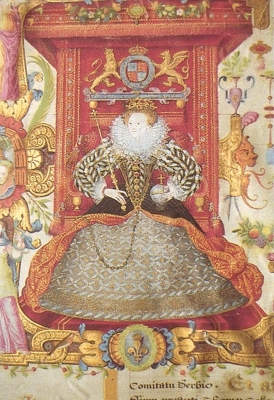
The year is 1600. Welcome to her Majesty Queen Elizabeth I, with her spokesperson Alison Weir.
How did you feel when your Mother, Anne Boleyn was beheaded?
Elizabeth I: I prefer not to dwell upon it and to say the least possible about the matter. My father was one of the greatest kings that ever ruled. I revere his memory and do not believe that he would have taken a wrong decision. But I find it hard to believe in my mother’s guilt.
How do your Councillors regard you?
Elizabeth I: Whenever my Councillors are difficult I remind them whose daughter I am.
What was it like having a privileged upbringing?
Elizabeth I: To a degree my upbringing was not privileged. I lived in luxury for the first years of my life, but after my mother was executed I was much neglected by my father and was not even given new clothes when I grew out of my old ones. When, through the kindness of various stepmothers, I was restored to favour, I was conscious of living a privileged life in palaces and of receiving a fine classical education. I was always in awe of my father and fearful of incurring his displeasure. For all my privileges I was kept very much in my place as the King's illegitimate daughter.
Do you lead a lonely life?
Elizabeth I: I have many women friends. Blanche Parry, my nurse, has been with me from infancy. Lady Mary Sidney is a close friend; she nursed my when I caught smallpox, and for her devotion caught it herself and was badly disfigured. The Countess of Northampton is a great friend, as is Lady Norris, whom I affectionately call my "Old Crow". I am fond of giving nicknames to my friends.
Do you regret never getting married?
Elizabeth I: No. I did not wish to marry. I decided as a young woman that I preferred the single life and when I became queen, I so much enjoyed being independent at last that I would suffer no man to rule me. To begin with, I was very happy as a single woman. For years I enjoyed the courtship and flattery of many men, all of whom were desperate to marry me. Later though, as I came into middle life I realised what I had given up and when my last courtship ended in inevitable failure, I became aware that I had given up my last chance of marriage and children and could not help weeping in Council.
If you had married would you have wanted children?
Elizabeth I: I was never particularly fond of the little imps, although I have had many godchildren and looked to their welfare, but I do concede that my position would have been more secure in some respects had I had a legitimate son to succeed me. However, I would still have feared that many of my subjects would have wished me to abdicate in favour of a son and riven my court with factions, as happened in my sister's reign, when I was the focus of plots against the throne. For this reason, I decided never to name my successor.
How long does it take for you to get dressed in the morning?
Elizabeth I: It takes about an hour. My robes need to be tied and laced together. My maids have to dress my hair or put on my wig, paint my face and adorn me with jewels. Villainous persons claim I have only one bath a year, but I have tiled bathrooms with mirrored walls and piped running water in my palaces , and when I go on progress through my kingdom, I take with me a portable bath. I use wood ash to wash my hair, clean my teeth with a herbal paste and now have a water closet called a jakes installed in at Richmond.
Do you like your portraits?
Elizabeth I: Not all of them, by any means. Many of the portraits painted in the early years of my reign were very poor likenesses and I ordered them to be destroyed. There are not many left now. As I got older, my ministers and I decided that there should be an official portrait type that all artists could copy. It was painted in the open air, as I think that shadows are ageing, and it shows me looking eternally youthful. Woe betide any artist who tries to portray me as an old woman. Their work will be destroyed.
Did you ever regret being Queen?
Elizabeth I: No. I had such a difficult youth with so many insecurities and dangers that I have always revelled in being a queen. However, wearing a crown is a greater thing to those who see it than those who bear it. There were times when 1 wished I were anyone else. For example, when I had to sign the death warrant of Mary, Queen of Scots. She was a foolish, light-minded woman, with very little political sense. Although I had to respect her as a sovereign princess, I could only deplore her choices in husbands, which cost her her throne. Then, with all Scotland up in arms against her she ran to me for help, begging for an army. Yet this was the woman who claimed to be the rightful Queen of England and denounced me as a usurper. She was a very dangerous person and it was not for nothing that I kept her locked up under strict surveillance to stop her endless plotting. I did not want to put her to death, but I had no choice!
Do you have black teeth? /
Elizabeth I: Yes I do, although that is an impertinent question. Thanks to a very impolite German visitor to my court, the whole world knows about it. I have had a lot of problems with my teeth, and once suffered toothache for months because I was too scared to have a tooth drawn. A very brave Bishop had one of his teeth pulled out in front of me to prove it did not hurt, but when I submitted to the operation I found out he was lying. After that I decreed that teeth were to be a taboo subject at my court.
Did you always take the advice of your councillors?
Elizabeth I: I have relied quite heavily on their advice. I have been fortunate in being blessed with the best set of advisers a prince ever had. There were times when they grew obstinate in my service and when they kept demanding that I marry. When they were in this mood, I would stay away from council meetings so that I would not be bullied into taking their advice. As I made clear to them from the start, I would have but one mistress in England, and no master.
How do you feel when you have to sign death warrants?
Elizabeth 1: As a merciful princess who abhors the shedding of blood, I hate having to sign death warrants. I put off signing the warrant of cousin, Norfolk, for months, much to the disgust of my ministers. I would sign the warrant and then retract it - sometimes in the middle of the night. When it came to Mary, Queen of Scots, I suffered agonies of indecision for weeks, while my councillors put enormous pressure on me to sign the warrant. But I feared to sanction the beheading of a sovereign princess in case it set a precedent. With that traitor Anthony Babington I was not so merciful. In Babbington's case I was so fearful that others would plot against me as he had that I demanded that the full rigour of hanging, drawing and quartering be used to dispatch him, as a warning of the fate of would-be traitors.
What type of music do you like?
Elizabeth I: I love many kinds of music, from John Dowland’s madrigals to William Byrd’s anthems - he is my organist in the Chapel Royal. I am an accomplished musician myself and play the lute and virginals, but only in private.
Do you think that a queen can be as good a ruler as a king?
Elizabeth I: I believe that women have limitations. As I said at Tilbury, before the Armada, I have the body of a weak and feeble women, but the heart and stomach of a King of England. Since my ministers believe women to be an inferior sex, I have to work twice as hard as a man, to retain their respect. I find it easier if I refer to myself in public as a prince rather than a princess, and although I try not to give way to what they see as feminine weakness, I am very good at using my wiles to get what I want.
What do you think of the way you have been portrayed in films,etc?
Elizabeth I: I think that there have been various operas and plays that have shown me as rather theatrical. I particularly admired the TV series Elizabeth R, with Glenda Jackson as myself. It was a very accurate portrayal, but I regret that I cannot say the same about the film Elizabeth, which is scandalous nonsense.
What are your favourite foods?
Elizabeth I: I enjoy a broth of meat for my breakfast, with fine white manchet bread. I usually eat sparingly and drink abstemiously. My favourite drink is specially brewed beer. Although I have decreed thst there be two fish days a week, Wednesday and Friday, I confess I do not always keep this rule. I have a weakness for sweet things, confectionery and marchpane. which has ruined my teeth!
We now have to close this audience with Elizabeth I. Many thanks, Your Majesty (and to Alison Weir, your spokesperson!!)
Some rare portraits of the young Elizabeth I:
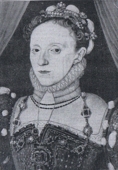
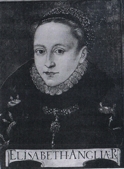
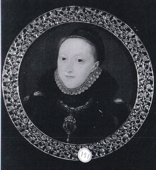

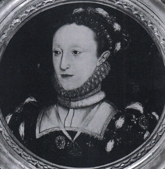
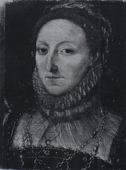
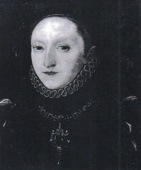
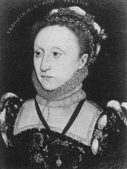
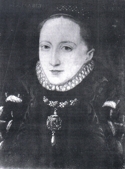
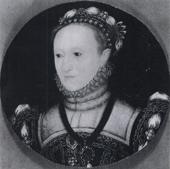
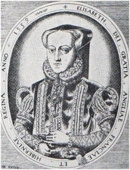
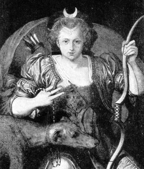
(For details, please contact me.)
In contrast to her mother, Anne Boleyn, reports of sightings of Elizabeth I’s ghost are few...

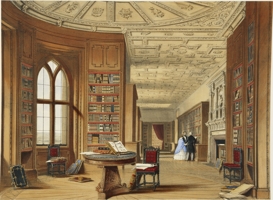
Elizabeth Southwell, one of her ladies-in-waiting, later claimed that, moments before the Queen’s death in 1603 at Richmond Palace, she herself left the room where her mistress lay. When she returned shortly afterwards, she was amazed to see the Queen striding purposefully towards her. Her amazement increased when, upon re-entering the royal chamber soon afterwards, she saw the dead body of the Queen in the bed. It was this apparent ‘visitation’ that gave rise to the legend that Richmond Palace – or the little that remains of it - is haunted by Elizabeth’s ghost. Less well known is the likelihood that the entire ghostly apparition had been dreamt up by Elizabeth Southwell, who had recently become a Catholic, and wanted to start a rumour that Elizabeth, the Defender of the Protestant faith, was a witch doomed to walk the earth forever. Even so, the ghost of the Queen, wearing a farthingale, is still said to appear outside the former royal Wardrobe on Richmond Green, or by the palace gatehouse, in the early hours of March 24, the anniversary of her death. Phantom hoof beats have also been heard.
Elizabeth is also said to haunt the royal Library at Windsor, where the clacking of her high heels has been heard on the floorboards, going across the library and into an inner room. This spectre is said to have been seen or heard on numerous occasions by several members of the Royal family and staff, not only here, but also walking on the castle walls, or at a window in Dean’s Cloister, always wearing a black gown with a black shawl over her shoulders. But some say that the shawl is actually a black veil covering the face of the apparition, so if stories of the sightings are true, it may not be the Queen's ghost after all.
Yet perhaps we cannot lightly dismiss the testimony of royalty. King George III, who spent many lonely nights at Windsor Castle, once claimed to have conversed with a ghostly woman dressed in black, who called herself Elizabeth and claimed to be ‘married to England’. Over a hundred years later, Edward VII is also said to have confided in one of his mistresses about a strange ghostly encounter he had had in Windsor Castle with a woman in dressed in black, who resembled portraits of the great Queen.
It has been claimed that the appearance of Queen Elizabeth’s ghost is linked to the outbreak of war. George VI is said to have seen it on several consecutive nights during the opening days of the Second World War. His daughter, Princess Margaret, is also said to have encountered this ghost.
There are claims that Elizabeth and her train have been seen riding through Bradwell Vale in Derbyshire, making for Tudor Hazelbadge Hall, but it’s hard to believe that, as in life Elizabeth never travelled that far north!











